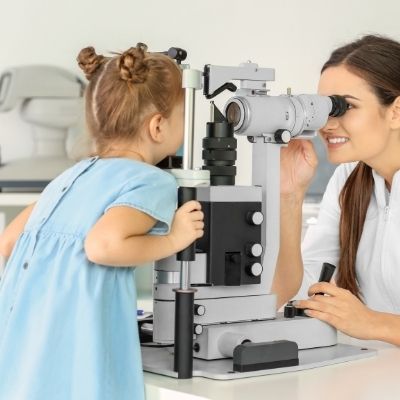Being able to see clearly is essential for your child’s education and overall wellbeing. Unfortunately, sometimes minor issues can go unnoticed and result in more problems later on. As a parent, it’s important to know the signs that your child needs to visit the eye doctor so they can get the help they need.
Common signs that your child needs to visit the eye doctor include:
- Difficulty seeing the board at school
- Pink eye
- Lazy eye
- Squinting to see better
- Being too close to digital screens
1. Difficulty Seeing the Board at School
It’s a common problem for kids to have trouble paying attention in class. After all, classrooms are full of distractions, from other kids to tablets. What’s less common, however, is children having trouble focusing due to not being able to see what’s happening. In this case, it may be even more difficult for your child to learn since they can’t see what they’re supposed to.
A child with an undiagnosed vision problem may find themselves rubbing their eyes, tilting their head, or squinting in order to see more clearly. The strain from trying to see can cause their eyes to feel tired and sensitive, or even cause frequent headaches.
If this sounds like something your child struggles with, then this could be one of the major signs that your child needs to visit the eye doctor. Dr. Travis Thompson and Dr. Catherine Abott can assess your child’s vision in the comfort of our Knoxville optical center in Hardin Valley. From there, they can diagnose whatever vision problems they’re having and determine the best form of treatment.
Click here to learn more about how your child’s vision can affect their performance at school!
2. Pink Eye
Pink eye is a clear sign that your child needs to visit the eye doctor. Also known as conjunctivitis, pink eye is the inflammation of the white part of the eye (the conjunctiva).
Pink eye is a common problem among children and is very contagious. This infection can surge through schools and playgrounds, leading to large groups of children contracting it. It can be caused by bacteria, viruses, and even allergies (allergic conjunctivitis).
Fortunately, pink eye is a minor infection and usually looks worse than it really is. In fact, certain types may not even require medical treatment. However, you’ll still need to bring your child to our Hardin Valley office to determine what type of conjunctivitis they have.
Dr. Travis Thompson and Dr. Catherine Abbott will be able to determine if your child’s pink eye is caused by:
- Bacteria
- A virus
- Allergies
Bacterial and viral pink eye are both contagious, with bacterial varieties requiring antibiotics. In most cases, viral pink eye will clear up on its own, although serious cases may require antiviral medication. Allergic conjunctivitis can be treated with oral antihistamines and eye drops.
3. Lazy Eye 
Lazy eye (amblyopia) occurs when a child experiences irregular vision development early on in life. This causes the weaker eye to “wander” while the stronger eye behaves normally. This condition usually sets in between birth and 7 years of age. It’s the leading cause of poor vision among children, so taking them to visit the eye doctor is essential.
Dr. Thompson or Dr. Abbott will perform an eye examination in their Hardin Valley office to check:
- Your child’s eye health
- For a wandering eye
- Differences in vision between both eyes
Eye drops are often used to dilate the eyes, which can cause blurry vision for a few hours or even a day.
Treatment for lazy eye can vary depending on the cause and how it impacts your child’s vision. Eye patches can be used, covering one eye in order to strengthen the other. Prescription glasses or contact lenses may also be prescribed to treat any other sight issues caused by amblyopia. Talk to our optometrists about which treatment is best for your child’s eyes.
Don’t take your child to the eye doctor unprepared. Click here for our tips on how to prepare them.
4. Squinting to See Better
We all squint our eyes to see better from time to time. Whether it’s to see tiny print, such as ingredients on a food label, or an object far away. However, excessive squinting may point to a problem with your child’s vision. In many cases, squinting could point to your child having a refractive error.
Refractive errors prevent light from reaching the brain as it normally would, leading to problems seeing clearly. When healthy, light enters the pupil and makes its way through the:
- Lens
- Vitreous humor
- Retina
- Optic nerve
Light will eventually make its way to the brain where it is turned into the images that we see. Refractive errors interrupt this process due to a misshapen eye, with two of the most common types being hyperopia and astigmatism. Another common refractive error is known as myopia which we will discuss further below.
Hyperopia, or farsightedness, makes it difficult to see things that are up close. This is due to your child’s eye being shorter than normal or having weak refractive abilities. Astigmatism can affect your close and distance vision. This is caused by a misshapen cornea that results in two focal points falling in two different directions.
When you bring your child to our Knoxville optical center, you can rest assured that they will receive the best eye care possible. Dr. Thompson and Dr. Abbott will determine what type of refractive error your child has and make sure they get the best corrective eyewear to suit their needs.
5. Being Too Close to Digital Screens
Parents have been complaining about kids sitting too close to screens since the invention of the TV. However, sometimes sitting too close to the television or computer screen, as well as holding smartphones too close to their face, may actually indicate a vision problem. While it may just be “kids being kids,” it could also point to nearsightedness.
Also known as myopia, nearsightedness is a refractive error where a person has trouble seeing things that are far away. While they can see things up close easily, objects that are further away may seem blurred or out of focus. This is a result of the eyeball being longer than normal and prevents light from reaching the retina as it normally would.
One thing you can do is ask your child why they’re sitting close to the television. It could be that they just don’t know any better. On the other hand, if they’re sitting close to see better then it may be time to bring your child to the eye doctor. Our optometrists can determine if your child needs glasses in order to see better at school and at home.
Have you noticed any signs that your child needs to visit the eye doctor? Contact us today to schedule an appointment!
There are a variety of signs that your child needs to visit the eye doctor. This can include trouble focusing in school due to an undiagnosed vision problem. Pink eye is a common problem that may require treatment from their eye doctor. Your child may also have one eye that’s weaker than the other, resulting in lazy eye. They may also squint or sit close to the television due to a refractive error.
Hardin Valley Eyecare & Optical has been serving Knoxville since 2009. Dr. Travis Thompson and Dr. Catherine Abbott specialize in the diagnosis and treatment of a wide array of eye diseases, conditions, and problems and are committed to improving the quality of life in the Knoxville community through enhanced vision. Located at 10904 Spring Bluff Way, you can schedule an appointment online or give us a call at (865) 888-0892.





